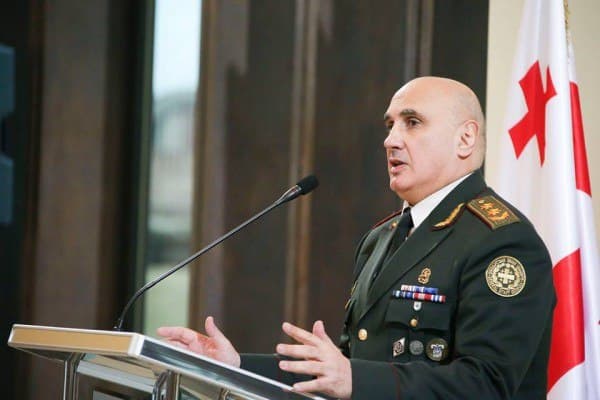General Kapanadze: ‘Putin faces his own dilemma – every time Russia’s army returned from war, revolution followed’

Author
Front News Georgia
The Russia-Ukraine war is entering a new phase of negotiations, though disagreements between the parties remain unresolved. Russian President Vladimir Putin has expressed readiness to meet Volodymyr Zelenskyy, but only under conditions unacceptable to Kyiv. These include territorial concessions that Western leaders describe as a “trap” designed to legitimise further Russian aggression.
Meanwhile, Ukraine and its Western partners continue discussions on security guarantees to safeguard the country’s sovereignty after the war. The international community remains divided: some leaders, including Donald Trump, have called for a quick halt to the war, though their proposals lack clarity. This signals that peace is still a long way off, and negotiations remain at the stage of testing positions.
On these and other issues, Front News spoke with Vakhtang Kapanadze, Former Chief of the General Staff of the Georgian Armed Forces.
Q. Donald Trump has claimed he could stop the war and understand both Russia’s and Ukraine’s positions within two weeks. How realistic do you find this statement, and what kind of plan might he have in mind?
A. To be honest, I pay more attention to what is actually being done rather than what Trump says. His statements are often inconsistent. How many times has he already “warned” Russia? We remember the 50-day deadline he mentioned before August 8, and now he speaks of two weeks. That is why it is hard to grasp the real substance of his words.
That said, I do not think the situation is deadlocked. To me, this looks more like a testing of positions, and I believe an agreement on a ceasefire will eventually be reached. However, I do not expect peace to be established within the next few years. For now, we are talking only about a ceasefire, not a full end to the war.
Q. European Commission Vice-President Kaja Kallas has called Russia’s conditions a “trap” that strengthens aggression. Putin demands recognition of four regions, some not even fully occupied by Russia. How do you assess Moscow’s terms, and what consequences could territorial concessions bring?
A. Trading territories is the Russian style. Putin’s logic is simple: seize vast areas, then negotiate by offering to give back some of them while keeping the rest. Russia is offering to “return” areas it cannot even hold.
For example, in the Sumy region, Russian forces have been nearly driven out, controlling only a few villages near the border. Yet they demand all of Donbas, which includes the Kramatorsk-Sloviansk defence zone — a possible springboard for an attack on Kharkiv. Why should Ukraine give that up?
The same goes for Kherson and Zaporizhzhia, where Russians cannot even cross the Dnipro River. These demands are illogical. Russia wants to obtain without fighting what it cannot achieve militarily. They have no real successes on the front line that could force Ukraine to agree. The West also rejects this logic.
Q. US officials, and Trump himself, often suggest that Ukraine should make concessions. Trump’s envoy, Steve Witkoff, will visit Ukraine soon. Do you expect growing US pressure on Kyiv to give up territory?
A. It is clear that Ukraine will have to make some concessions, but I believe these should only involve freezing the conflict and halting hostilities along the current front line. As for territorial concessions, that is absolutely unacceptable. Ukraine simply cannot agree to such terms.
Q. During his visit to Ukraine, NATO Secretary General Mark Rutte discussed security guarantees. What kind of guarantees might Ukraine expect after the war, and would they be enough to deter future Russian aggression?
A. There are several possible models for peace. One is third-party guarantees, where Western countries, including Japan and Australia, pledge support. But monitoring missions are usually ineffective; we saw this in Ukraine since 2014, and in Georgia too.
Deployment of a military contingent along the ceasefire line – this could deter Russia, since they would hesitate to kill German or British soldiers.
Stationing Western troops in Ukraine itself – though the most reliable guarantee remains Ukraine’s own armed forces. Even Western allies acknowledge this. They insist military aid to Ukraine must never stop. Ukraine must become a steel barrier. Western support would then strengthen after a ceasefire.
Q. But Putin has always opposed NATO troops on the front line as peacekeepers. Could Russia ever agree to such deployments?
A. Let’s be clear: Putin has already swallowed many things he once rejected. He used to refuse any talks with Zelenskyy, even calling him a “terrorist.” Now he is seeking ways to negotiate.
Putin faces a dilemma. Ending the war and bringing back such a massive army to Russia would be dangerous for him. It would deal a heavy blow to Russia’s social stability. Soldiers receive salaries while at the front; once they return home, they will be jobless and penniless. This could cause serious problems for the Kremlin.
Historically, every time the Russian army returned from war, revolutions followed. After the Napoleonic wars, the Decembrist uprising erupted. The same happened after the Russo-Japanese war and when troops returned from Afghanistan.
If a ceasefire is agreed, the army would remain stationed at the front rather than disbanding and returning home. That way, this mass of soldiers would not penetrate deep into Russian society. This is why Putin seeks a ceasefire arrangement that allows him to claim victory and present the war as “won.”
Tags:
Vakhtang Kapanadze




